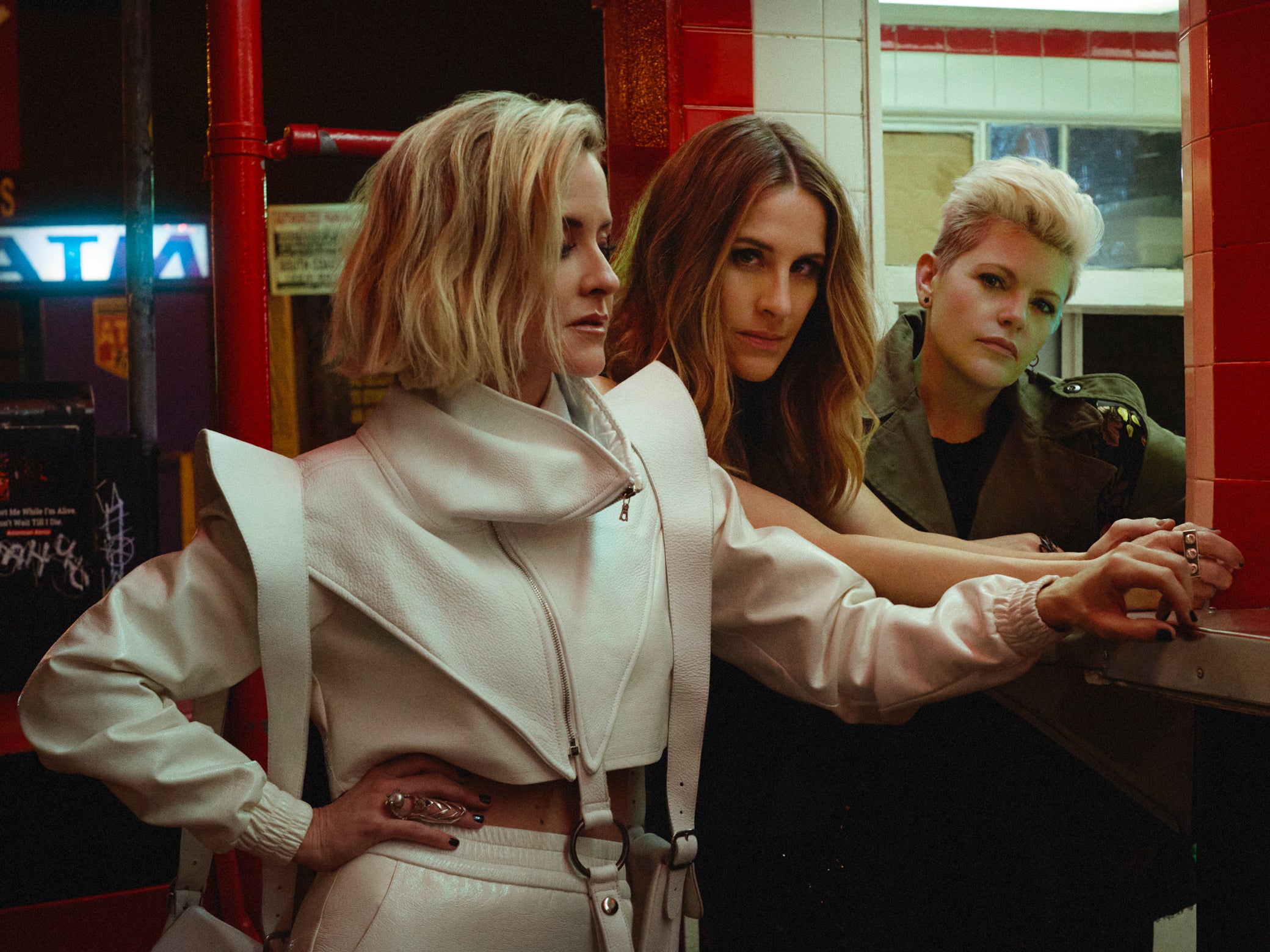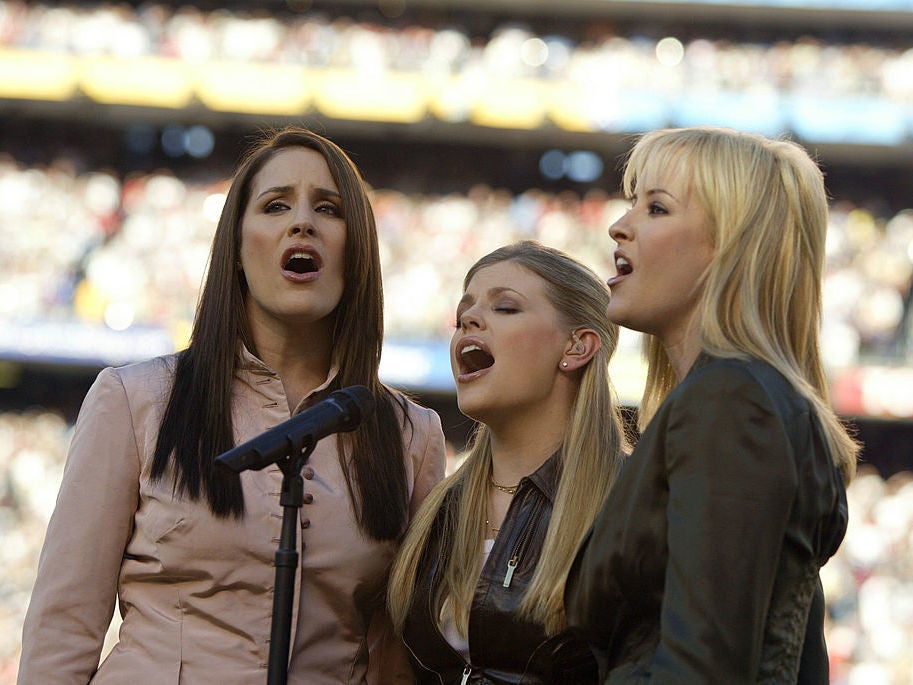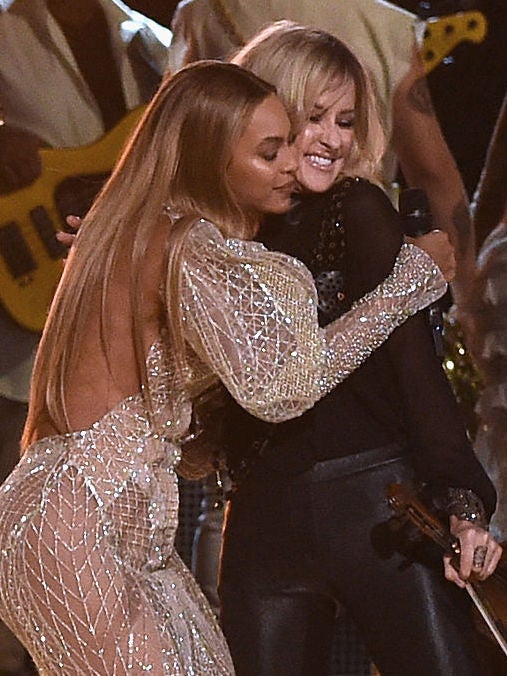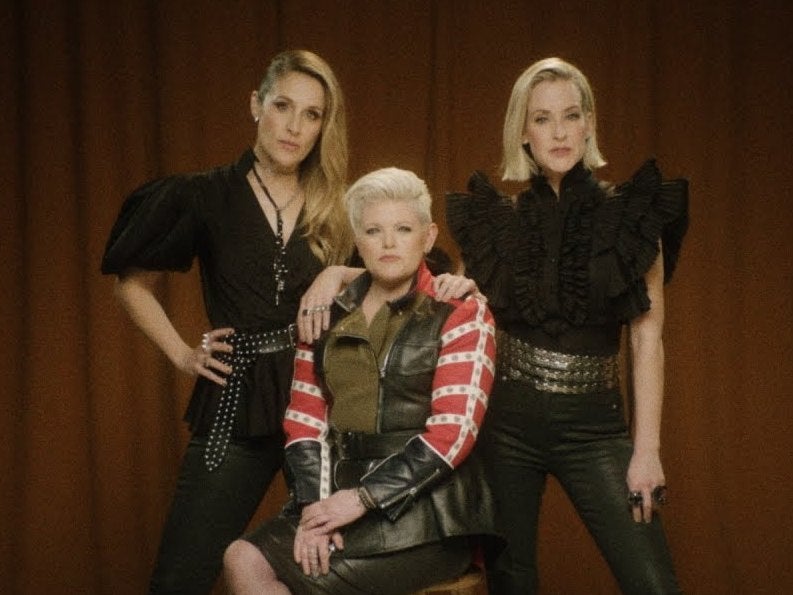The Chicks: ‘If George Floyd’s murder hadn’t happened, we might’ve waited a couple of years to change our name’
The formerly named Dixie Chicks talk to Laura Barton about why they changed their name, Trump, their new album, and gaslighters

Your support helps us to tell the story
From reproductive rights to climate change to Big Tech, The Independent is on the ground when the story is developing. Whether it's investigating the financials of Elon Musk's pro-Trump PAC or producing our latest documentary, 'The A Word', which shines a light on the American women fighting for reproductive rights, we know how important it is to parse out the facts from the messaging.
At such a critical moment in US history, we need reporters on the ground. Your donation allows us to keep sending journalists to speak to both sides of the story.
The Independent is trusted by Americans across the entire political spectrum. And unlike many other quality news outlets, we choose not to lock Americans out of our reporting and analysis with paywalls. We believe quality journalism should be available to everyone, paid for by those who can afford it.
Your support makes all the difference.The record company had already pressed 400,000 copies of the Dixie Chicks’ new single when the band announced they were changing their name. It was June 2020, and in the wake of the murder of George Floyd, millions of people had taken to the streets in support of the Black Lives Matter movement. Suddenly a band name that nodded to America’s shameful racial history seemed to stick in the craw. The country trio Lady Antebellum had already morphed into Lady A. Now the best-selling female band in the US, whose name referenced the Mason-Dixon line which separated the free and the slave-owning Southern states, were following suit. Henceforth: The Chicks. “The label made a sticker insert for the singles they’d already printed,” says the band’s multi-instrumentalist Emily Strayer, “so that people could do their own edit.”
It was the trio’s lead vocalist, Natalie Maines, who made the suggestion. She had been struck by the decision of the American car racing organisation Nascar to ban the Confederate flag. “Oh my god,” she thought, “if Nascar can do that, we gotta change our name for sure.” She texted the others. “Everybody was right on board,” she says. “It almost seemed like people were wondering what had taken us so long.” After all, as Strayer’s sister and fellow multi-instrumentalist Martie Maguire puts it: “We knew people knew what our politics were and where we stood.”
The Chicks’ politics have been quite clear ever since 2003 when, just days before the US invasion of Iraq, Maines told an audience in London that the band were “ashamed” that the president, George W Bush, came from their home state of Texas. The backlash was immediate and intense. With a fanbase that had been rooted largely in the conservative south of the US, many saw their liberalism as a betrayal. DJs at country music stations held CD-burning parties for disgruntled former fans. For years, their music was blacklisted on broadcast networks, and that year they were shunned at the American Country Music Awards. “We don’t feel a part of the country scene any longer,” Maguire told an interviewer that September. “It can’t be our home any more.”
Country had been The Chicks’ home ever since they formed in Dallas in 1989, back in an era that now feels “like a different lifetime” to Strayer. Maines had yet to join the band, and the sisters played a bluegrass-country hybrid with two other young women. The name, taken from the Little Feat song “Dixie Chicken”, did not strike them as problematic in those days. It spoke to the “kitschy and cowgirl and western swing” music they played. “And I was just happy to be making money when I was 16, so I wasn’t thinking too much about a name, I have to be honest,” Strayer says.
“People who live in the South have lived with the word ‘Dixie’ and the flag for a long time,” adds Maguire. “And a lot of people not thinking of the connotations of it. I think about Dixieland music, and the flag is everywhere, but you definitely feel like you have to wake up and mature up and go well, wait a minute, no, this is hurtful, this is something that has very negative connotations. And it takes a movement. If Black Lives Matter and George Floyd’s murder hadn’t happened, we might’ve waited another couple of years, I don’t know, but it definitely lit a fire in us to be on the right side of history.”
The incident in 2003 later proved them to be on the right side of history, too: the investigation into weapons of mass destruction – cited by Bush as justification for the invasion, found no evidence for their existence. Though opinions towards The Chicks subsequently softened, the band note few have apologised. “Howard Stern apologised,” Maguire says, of the famed DJ. And a woman captured in Shut Up and Sing – the 2006 documentary about the fall-out from the Iraq comments – telling her young daughter to say, “Screw you!” to the band wrote to say she was now mortified.

Though they may have lost a large percentage of their country fan base, everything that happened in 2003 led The Chicks to be embraced by a more mainstream audience. That year they won three Grammys, Bruce Springsteen voiced his support, and the album that followed, Taking the Long Way, was fantastically defiant – several songs referencing the incident, and its lead single titled “Not Ready to Make Nice”, suggested they were content with the non-amicable separation from the country scene. “I’d rather have a smaller following of really cool people who get it,” Maguire said at the time.
The really cool people who have embraced The Chicks in the years since have included Taylor Swift, who not only cites the band as a major influence but invited them to guest on her 2019 album Lover. And then there is also Beyoncé, who asked them to appear with her at the Country Music Association Awards. And Grimes, who was pictured leaving the studio wearing one of their T-shirts.
All the while The Chicks themselves were largely on hiatus. Over the past 14 years, Strayer and Maguire have released music as a duo, Maines recorded a solo album, largely made up of covers. But the trio have not been idle. There have been children to raise (Strayer has four, Maguire three, Maines two) and divorces to wade through – most recently Maines parted ways from the actor Adrian Pasdar, and though the divorce was finalised late last year, ongoing legal wranglings mean she is unable to discuss the details of their separation today.
Enjoy unlimited access to 100 million ad-free songs and podcasts with Amazon Music
Sign up now for a 4 month free trial (3 months for non-Prime members)
Enjoy unlimited access to 100 million ad-free songs and podcasts with Amazon Music
Sign up now for a 4 month free trial (3 months for non-Prime members)

Still, the breakdown of their relationship apparently fuelled much of the new record (certainly enough that Pasdar attempted to block the release of any music that might allude to their marriage; he failed) and the new songs’ lyrics offer a glimpse into its unravelling. Latest single “Sleep at Night” recalls being introduced to a partner’s mistress at the Hollywood Bowl, and the peculiarity of being called up by “my husband’s girlfriend’s husband”. “It’s so insane that I have to laugh,” she sings.
And then there is the gloriously anthemic “Tights on My Boat”, in which our heroine appears to have found incriminating evidence of an affair on a yacht. Many have attempted a forensic analysis of the lyrics, one publication even unearthing a rather overwrought essay Pasdar wrote for Mariner magazine.
Did it feel delectable to include such details in these lyrics? Maines laughs heartily. “Well, ‘Tights on My Boat’ is not a real thing,” she says, and laughs some more. “I know, people really want it to be real.” “There’s truth in everything, but we just piece things together,” offers Strayer, also beginning to laugh. “There were tights … but there were not tights found on a boat.”
She pauses. “But what grown woman wears tights?” she wonders. “That sounds like something a little girl would wear.” Maines steadies herself momentarily. “We wear tights!” she says. “Fishnets!” Strayer shakes her head: “We wear stockings!” she insists. “We haven’t dug into the tights thing yet,” she says.
Still, as both the 2003 incident and Pasdar’s failed legal action reveal, The Chicks are perhaps the only female act that can instil in men a strangely fearful rage. They have upset a president, sued their label for underpayment, weathered an encounter with an incandescent Harvey Weinstein (though his wrath was not directed at them, but the two filmmakers behind Shut Up and Sing) and when they took to the stage with Beyoncé, apparently caused several label executives to flounce out. “One person in particular walked out,” Maguire smirks. “But I told my daughter he had to go potty.”
Three years ago people didn’t know what gaslighting was, but now everyone knows what it is because of Trump
I wonder whether these encounters have emboldened their songwriting. “Well yeah I think we’ve felt the shackles were off more and more with each album,” Maines says. “But I think we had dads that raised us to stand up for ourselves, and [to know] that we’re as good as any guy, and we can play the game and be in it. It just always seemed to be natural for us to be OK with who we are, and saying who we are, and what we need to, and how we feel.”
It was more serendipity than intention that led The Chicks to release this album in an election year. Now spread between San Antonio and Austin in Texas, and Los Angeles in California, the challenges of geography combined with coordinating custody schedules with ex-husbands, meant that a recording process that began in the spring of 2018 stretched on. Still, there is something rather charmed about unveiling an album called Gaslighter just as the current president’s behaviour grows increasingly bewildering. “Every time you think it can’t get more unbelievable,” says Maines, “it gets more unbelievable.”
“Three years ago people didn’t know what gaslighting was,” she notes, “but now everyone knows what it is because of Donald Trump. So we didn’t ever consider any other titles for the album.” Was it a word familiar to them pre-Trump? Maines draws her mouth into a neat line. “Yes, I learned about gaslighting in therapy,” she says. The sisters raise their hands to volunteer that this was where they too first heard the word and its meaning. “If you’re on the receiving end of it you couldn’t possibly think that someone could do that on purpose, because it’s so not your MO,” says Strayer. “So to be taught that no, this person is really trying to manipulate you through this process, it just blew my mind.” Maines laughs for a long, long time. “And then it all made sense!” she says eventually, and laughs again, more hollowly this time.

For Gaslighter, the band worked with pop producer Jack Antonoff, engineer Laura Sisk, and a range of co-writers including Annie Clark (better known as St Vincent) and Teddy Geiger (who wrote the UK number one “Stitches” for Shawn Mendes). “There’s some very accomplished, amazing songwriters on this album,” says Strayer. “It’s always good for us, especially when we’re not in songwriting practice after 14 years, to be a student of it – back with all these other people who do it so well and can pull all these ideas out of you.”
“What I learned from these writers and from working with Jack was building the track as you write,” Maines says. “And it was so helpful – it just opened up a million more ideas for melody, for more rhythmic, percussive phrasing. I can’t imagine going back to writing with an acoustic guitar.” It is also, she continues, a more “conversational and raw and in your face” record, reflective of the rap and hip hop that makes up much of her own listening these days. “It’s not trying to be poetic, or too rhymey,” she says. They have let go, Strayer adds, of the driving notion of “let’s take an idea and try to make it prettier”.
This week, The Chicks should’ve been playing Madison Square Garden. Like all musicians, they have found that the tour they had already rehearsed and plotted has been postponed because of the pandemic. They all look downcast. “We were excited just to sing these songs with the audience,” Maines says. “And I say with, because it’s not for, they literally know every word.”
Instead they have been going through the most exhausting album launch of their lives. The music industry has changed radically over the past 14 years. Suddenly they have to get their heads around the immediacy of the digital world, streaming, visualisers, Zoom interviews and the challenges of a live online performance when your band members live in three different cities.
They have had to learn new skills, and quickly: how to film themselves, photograph themselves, do their own photoshoot make-up. Maines has taken to watching YouTube videos about photographic lighting. Maguire once allowed her 12-year-old daughter to do her make-up but decided the pink and purple eyeshadow she ended up with was perhaps not the best look for the camera.
“I think it’s interesting though how quickly the brain adapts,” says Maines. “I remember at the beginning of quarantine to see TV shows [made] via Zoom was so sad and weird. And now it’s so normal. I’ve gone to virtual comedy shows – they’re actually really funny! And we went to a virtual fundraiser the other night and met President Obama for the first time!” The three of them light up at the memory. I tell them I can’t believe The Chicks, famed liberal figureheads, hadn’t met Obama sooner. Maines laughs. “Oh,” she says. “I think he didn’t like our name!”
Gaslighter is out now
Join our commenting forum
Join thought-provoking conversations, follow other Independent readers and see their replies
Comments